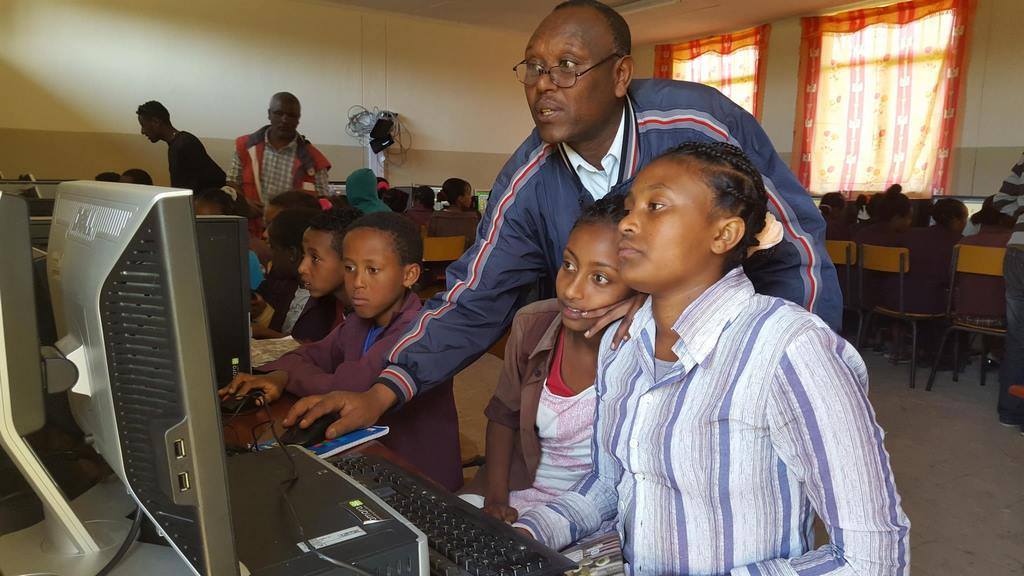(Vtrend.vn) Dell works with nonprofits worldwide to give underserved youth better access to technology, creating a culture of inclusion and lifelong interest in STEM learning.
Technology is transforming every industry, from agriculture to automotive, fashion to finance. The future belongs to those who can use technology to solve problems and drive human progress. That’s why Dell views access to technology not as a luxury but as a necessity.
Through our Youth Learning program, Dell is working with nonprofit partners worldwide to give underserved youth better access to technology and education. Going beyond access, we’re also creating a culture of inclusion, wherein science, technology, engineering and math (STEM) learning is seen as being for everyone — boys and girls, rich and poor. And we’re teaching youth of all backgrounds how to be persistent and work though challenging problems.
In FY18, Dell provided grant funding, volunteers and technology to 49 Youth Learning partners in 15 countries. This year, our Youth Learning initiatives directly impacted more than 468,000 youth enrolled in Dell-funded programs, and indirectly impacted another 1.1 million people who used the technology we donated to the programs. Overall, we’ve directly impacted 2.6 million youth since FY14. This puts us 66 percent of the way toward our 2020 Legacy of Good goal of helping 4 million youth.
We have also evolved our strategy to focus on programs that can reach a high number of students, therefore increasing the positive impact we and our partners can have around the world. Further, in the U.S. we are working with our partners to incorporate more STEM learning during the school day. This will help us reach more youth than we can through optional after-school programs alone. In addition to improving digital literacy, we are working to increase kids’ involvement with computer science and applied sciences.
Fostering innovation through hands-on learning in India
While most children living in India’s rural areas are enrolled in school, according to the ASER Centre’s 2017 Annual Status of Education Report (Rural), many are not acquiring foundational skills like reading and basic arithmetic that can help them progress in school and in life. For example, only 43 percent of students aged 14–18 can do a division problem and just 54 percent can read and understand most written instructions. To address these challenges, in FY18 we expanded our partnership with Sikshana Foundation, enabling them to bring their Sikshana Technology in Education Program (STEP) to 27,000 students at 362 schools in the States of Karnataka and Maharashtra. STEP is a competency-based program that transforms the way students learn. Students use Dell laptops and tablets for teacher-led, interactive lessons, with fun challenges that help them learn information and communications technology (ICT) skills, and apply these skills to their curriculum-aligned project work. Most students have had little exposure to technology, and the program helps to address the digital divide.
STEP also digitizes the education system so schools can track students’ progress in real time and aggregate data at the school, district and state levels. And it trains teachers to use a technology-based curriculum. Dell team members volunteer for STEP by mentoring students at school, hosting students at Dell for trainings and providing curriculum guidance.
“We are working with children for their future, to enable them to learn and get closer to being what they want to be,” said Ganesh Sarma, a Dell volunteer with STEP. “There are very few things that give me as much happiness as investing time in a child’s future.”
In FY18, Dell partnered with NITI Aayog — a Government of India think tank — and our Youth Learning partner, Learning Links Foundation, to support Atal Tinkering Laboratories (ATL) in 13 government schools. ATL fosters curiosity, innovation and STEM learning through hands-on experimentation. Most participating students hadn’t used technology previously and are from low-income communities, and several have made the finals in various national innovation competitions. These include Harshita, a ninth-grade student from Bengaluru, who worked with two of her classmates to develop the prototype for an IoT device for the visually impaired. Students from Chhattisgarh created a system for converting the kinetic energy produced by gym equipment into electrical energy stored in batteries for future use, and it was recognized as one of the top 30 innovations.
Raising digital literacy rates in Ethiopia

Students in Ethiopia learn to use technology through Dell’s Youth Learning program in partnership with Camara Education. This initiative will also train teachers and school leaders.
Ethiopia ranks 174 out of 188 countries on the United Nations’ 2016 Human Development Report, making it a critical area for educational investment. Ethiopia’s Ministry of Education has prioritized ICT training as a key pillar for improving education. It has launched an initiative to bring technology learning to 1.2 million students over the next three years. As our first large-scale Youth Learning program in Ethiopia, we are equipping over 400 schools with Dell computers. We are also providing grant funding for our longtime partner Camara Education to deliver more than 16 million hours of ICT education training to over 3,000 teachers and school leaders. This is a transformational program, bringing the power of technology to 400,000 youth aged 6–18 who currently lack access to technology at home or at school.
Developing a culture of inclusion in the U.S.

Dell’s Youth Learning partner Girls Who Code helps thousands of female students to learn valuable computer science and problem-solving skills.
In the U.S., Dell partners with many nonprofits that cultivate inclusion and teach persistence in STEM studies, especially among young women. One of these is Girls Who Code, which is closing the gender gap in technology by introducing middle and high school girls to coding and helping them feel confident they belong in technology fields.
In FY18, Dell supported Girls Who Code’s mission to create free after-school clubs in every state. The clubs teach sixth- through 12th-grade girls to use their coding skills to address real-life problems in their communities. We also participate in Girls Who Code’s seven-week Summer Immersion Program, inviting the program’s 11th- and 12th-graders on field trips to Dell as part of their immersive instruction in web, robotics and mobile development. The club not only provides experience, but also a safe place to learn how to fail.
Minh Xuân
Vtrend/Dell





